 |
Znanstveno-struèni
èasopis Hrvatskog dru¹tva za geometriju i grafiku Scientific and Professional Journal |
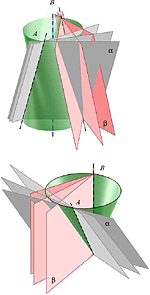 | Gunter Weiß, Franz Gruber (Gunter.Weiss@tu-dresden.de)
How to generalize Thales' Theorem?The classical theorem of Thales can be generalized - depending on someones interpretation - in several elemental or abstract ways. This paper tries to classify such generalizations without claim of completeness. We structured this work in a way that is suitable for educational purposes by emphasizing aspects of mathematical research. Beside more or less known facts, we present new insights and approaches to one of the most important theorems of geometry.Key words: Thales' Theorem 3D, constrained motions, spatial kinematics, trihedron  Article in PDF. Article in PDF.
|
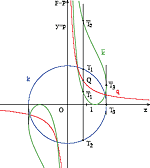 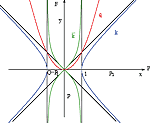 | Ema Jurkin (ejurkin@rgn.hr)
Automorphic Inversion and Circular Quartics in Isotropic PlaneIn this paper circular quartics are constructed by automorphic inversion (inversion that keeps the absolute figure fixed) as the images of conics. They are classified depending on their position with respect to the absolute figure. It is shown that only 1, 2 and 4-circular quartics can be obtained by automorphic inversion.Key words: isotropic plane, circular quartic, automorphic inversion  Article in PDF. Article in PDF.
|
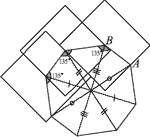 | H. Bariº Çolakoglu, Rüstem Kaya (bariscolakoglu@hotmail.com)
Regular Polygons in the Taxicab PlaneIn this paper, we define taxicab regular polygons and determine which Euclidean regular polygons are also taxicab regular, and which are not. Finally, we investigate the existence or nonexistence of taxicab regular polygons.Key words: taxicab distance, Euclidean distance, protractor geometry, regular polygon  Article in PDF. Article in PDF.
|
 | Nilgün Sönmez (nceylan@aku.edu.tr)
Trigonometric Proof of Steiner-Lehmus Theorem in Hyperbolic GeometryIn this study, we give a trigonometric proof of the Steiner-Lehmus Theorem in hyperbolic geometry.Key words: hyperbolic geometry, hyperbolic triangle  Article in PDF. Article in PDF.
|
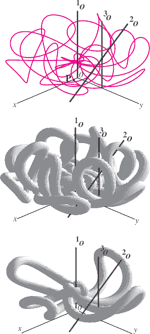 | Tatiana Olejníková (tatiana.olejnikova@tuke.sk)
Cycloidal Cyclical SurfacesThe paper presents a family of cycloidal cyclical surfaces, which are created by a movement of a circle alongside the special spatial cycloidal curve, where the circle is located in the curve normal plane and its centre is on this curve. The spatial cycloidal curve can be created by simultaneous revolution of a point about three different axes 3o,2o and 1o in the space. The form of the cycloidal curve and also of the cycloidal cyclical surface depends on the relative position of the three axes of revolutions, on multiples of angular velocities and orientations of separate revolutions. The analytic representation, the classification of surfaces and some of their geometric properties are derived.Key words: revolution, translation, angular velocity, cycloidal curve, cyclical surface  Article in PDF. Article in PDF.
|
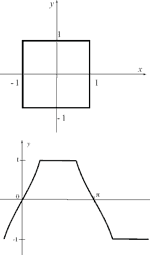 | Ayºe Bayar (akorkmaz@ogu.edu.tr)
On the Trigonometric Functions in Maximum MetricThe trigonometric functions are defined on the unit circle and the shape of the unit circle changes according to the metric. So, the values of the trigonometric functions depend on the specific metric. This paper presents definitions, rules, and identities of trigonometric functions with respect to maximum metric. Also, geometrical interpretations by using the identities of these functions are given for further work.Key words: trigonometric functions, non- Euclidean metric, maximum metric  Article in PDF. Article in PDF.
|
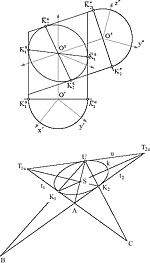 | Marco Hamann (Marco.Hamman@tu-dresden.de)
On Axonometric Projection of the Contour of a SphereThe present article refers to a question that arose during the lecture of descriptive geometry for undergraduate students in the fields of geodesy and cartography: If the axonometric projection of the contour of a sphere is constructed with the help of the cutting method (L. Eckhart , 1937), the pairs of contour points with regard to the cutting directions of two non-associated auxiliary projections determine two in general non conjugate diameters and their conjugate directions of the ellipse of contour. Conversely an ellipse is in general overdetermined by two given diameters and their conjugate directions. The theorem of Pascal can be deduced from the figure of construction whereby the construction of the ellipse of contour is considered from a planar point of view.Key words: Axonometric projection of a sphere, ellipse of contour, theorem of Pascal, conic  Article in PDF. Article in PDF.
|
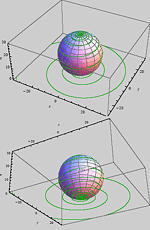 | Vedran Car, Dino Dragun, Jelena Beban - Brkiæ (7vcar7@gmail.com)
Multimedia Concept in Visualization of the Polar Stereographic ProjectionThe paper deals with topic of polar stereographic projection with emphasis on the ICT application in teaching. The formulae for the above mentioned projection have been derived, which made it possible for it to be visualized by writing the codes in the program Mathematica, and the multimedia component has been achieved by implementing it into video record by means of the program Bulent's Screen Recorder from the group of Desktop Screen Recorders.Key words: information and communication technologies (ICT), e-learning, cartographic projection, polar stereographic projection, visualization  Article in PDF. Article in PDF.
|